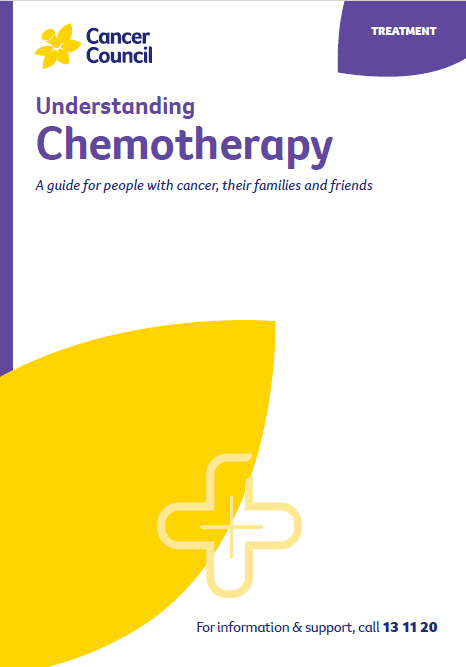- Home
- Non-Hodgkin lymphoma
- Treatment
- Chemotherapy
- Side effects of chemotherapy
Side effects of chemotherapy
The side effects of chemotherapy vary depending on the drugs given. Everyone reacts to chemotherapy differently. You may have other side effects not mentioned here. For more information about chemotherapy and how to manage any side effects, call Cancer Council 13 11 20, or see our general section on Chemotherapy.
Common side effects of chemotherapy
FatigueSevere tiredness and lack of energy (fatigue) may make you feel drowsy, exhausted or confused. These symptoms can last for several weeks or months after chemotherapy. Check with your doctor whether your fatigue is related to a low red blood cell count (anaemia). Anaemia may be treated with blood transfusions. Otherwise, keeping active and exercising can help you feel less fatigued.For more on this see, Fatigue and cancer and listen to our podcast on Managing Cancer Fatigue. | |
Nerve effectsSome chemotherapy drugs can cause nerve damage (peripheral neuropathy). Symptoms can include tingling, pain or loss of feeling in your fingers and/or toes, and muscle weakness in your legs. These side effects usually disappear after treatment ends, though they can last a long time or even be permanent.For more on this, see Peripheral neuropathy. | |
Increased risk of infectionChemotherapy reduces your white blood cell level (neutropenia), making it harder for your body to fight infections.Learn ways to reduce your risk of infection. | |
ConstipationSome chemotherapy drugs and anti-nausea medicines can cause constipation. Ways to prevent this include drinking 6–8 glasses of water a day, eating a high-fibre diet and getting daily exercise. Your treatment team may also suggest or prescribe a suitable laxative or stool softener. | |
Bleeding or bruisingA drop in the number of platelets in your blood (thrombocytopenia) can cause heavy bleeding from small cuts or make you bruise easily. You may be given a platelet transfusion to increase your platelet count. | |
Hair lossYou may lose some hair from your head, eyebrows and eyelashes. Your hair will grow back after treatment, but it may look or feel different. You may be able to borrow a wig from a wig library. If you have private health insurance, your fund may cover part of the cost of a wig.For more on this, see Hair loss. | |
Nausea and vomitingYou will usually be given anti-nausea medicines before having chemotherapy to stop you feeling sick or vomiting. These usually work very well. If you still feel sick or keep vomiting after using the prescribed medicine, let your nurse or doctor know so that another medicine can be tried.For more on this, see Nutrition for people living with cancer or listen to our podcast on Appetite Loss and Nausea. | |
Mouth soresChemotherapy can damage the cells in the mouth causing mouth sores. These usually get better after treatment ends. Keeping your mouth clean will help prevent infections. Use a soft toothbrush after each meal to keep your mouth clean. If using a mouthwash, choose alcohol-free products.For more on this, see Mouth health and cancer. |
→ READ MORE: Taking care with infections
Podcast: Managing Cancer Fatigue
Listen to more of our podcast for people affected by cancer
More resources
Dr Puja Bhattacharyya, Haematology Staff Specialist, Western Sydney Local Health District, Blacktown Hospital; A/Prof Christina Brown, Haematologist, Royal Prince Alfred Hospital and The University of Sydney; Dr Susan Carroll, Senior Staff Specialist, Radiation Oncology, Royal North Shore Hospital and The University of Sydney; Jo Cryer, Clinical Nurse Consultant, Haematology, St George Hospital; Marie Marr, Consumer; Katelin Mayer, Clinical Nurse Consultant, Cancer Outreach Team, Nelune Comprehensive Cancer Centre, Sydney; Vanessa Saunders, 13 11 20 Consultant, Cancer Council NSW; Elise Toyer, Haematology Clinical Nurse Consultant, Blacktown Hospital.
View the Cancer Council NSW editorial policy.
View all publications or call 13 11 20 for free printed copies.

